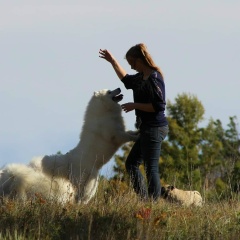Я сегодня была в Одессе. Ну как - была: такой необыкновенный эффект присутствия создает фильм Валерия Тодоровского (а снимали его, как оказалось, по всяким причинам вовсе не в Одессе, а в Сочи и Таганроге). Он вовлекает тебя в сюжет с первых кадров - от солнечного света на полу, сквозь который летят пылинки, и хочется протянуть к ним руку, до семейных разборок на кухне, и ты сочувствуешь всем героям сразу и каждому в отдельности, потому что у каждого из них своя правда. Этот фильм как зеркало или как тексты Сэлинджера, ты видишь в нем что-то своё - или кого-то: узнаёшь дедушку, сестру, соседа или неожиданно ставшего тебе близким человека, которого ни за что нельзя отпускать домой в другой город - иначе все, мир рухнет, особенно когда тебе 15.
Все это происходит во время эпидемии холеры, которая здесь только фон, завязка, предполагаемые обстоятельства, но именно поэтому события развиваются так, как развиваются. И разве можно, например, спокойно смотреть сцену, когда Григорий Иосифович (герой Ярмольника) напивается воды из моря - специально, чтобы заразиться холерой - приходит домой и запирается в туалете, а на все уговоры родственников обратиться к врачу отвечает вопросом: "Имею я право умереть дома?" (но если что - все обходится).
Фильм "Одесса" - об атмосфере летней пронизанной солнцем Одессы 70-х и истории одной большой семьи, о проблеме выбора - между тем, как хочется, но невозможно, и тем, как надо, но невозможно тоже (и почему-то тем не менее кажется, что все впереди) , о национальной проблеме, о взрослении. Пойти в кино стоит хотя бы еще ради того, как красиво курит в кадре флегматичный Цыганов, и вроде бы он все тот же, каким был в "Питере fm", но в одной из последних сцен вдруг совершенно другой, и хотя его герой неправ, ты опять искренне ему сопереживаешь. Ради удивительной игры Ирины Розановой (слово "игра" тут как-то даже неудобно произносить - полное перевоплощение, проживание) и ради двух жизненных фраз, которые произносит Григорий Иосифович: " Так нельзя. Если всем вокруг плохо - значит, нельзя", "Не откладывай на завтра, делай сейчас".
А сына героя Цыганова, кстати, зовут Валерик, и у него такая же родинка над губой, как у Тодоровского. Ведь неслучайно?
Все это происходит во время эпидемии холеры, которая здесь только фон, завязка, предполагаемые обстоятельства, но именно поэтому события развиваются так, как развиваются. И разве можно, например, спокойно смотреть сцену, когда Григорий Иосифович (герой Ярмольника) напивается воды из моря - специально, чтобы заразиться холерой - приходит домой и запирается в туалете, а на все уговоры родственников обратиться к врачу отвечает вопросом: "Имею я право умереть дома?" (но если что - все обходится).
Фильм "Одесса" - об атмосфере летней пронизанной солнцем Одессы 70-х и истории одной большой семьи, о проблеме выбора - между тем, как хочется, но невозможно, и тем, как надо, но невозможно тоже (и почему-то тем не менее кажется, что все впереди) , о национальной проблеме, о взрослении. Пойти в кино стоит хотя бы еще ради того, как красиво курит в кадре флегматичный Цыганов, и вроде бы он все тот же, каким был в "Питере fm", но в одной из последних сцен вдруг совершенно другой, и хотя его герой неправ, ты опять искренне ему сопереживаешь. Ради удивительной игры Ирины Розановой (слово "игра" тут как-то даже неудобно произносить - полное перевоплощение, проживание) и ради двух жизненных фраз, которые произносит Григорий Иосифович: " Так нельзя. Если всем вокруг плохо - значит, нельзя", "Не откладывай на завтра, делай сейчас".
А сына героя Цыганова, кстати, зовут Валерик, и у него такая же родинка над губой, как у Тодоровского. Ведь неслучайно?
I was in Odessa today. Well, as it was: such an extraordinary effect of presence was created by a film by Valery Todorovsky (and, as it turned out, they shot it for any reason not at all in Odessa, but in Sochi and Taganrog). It draws you into the plot from the first shots - from the sunlight on the floor through which dust particles fly, and you want to reach out to them, to the family showdowns in the kitchen, and you sympathize with all the heroes at once and individually, because each of them own truth. This film is like a mirror or like Salinger’s texts, you see in it something of your own - or someone: you recognize your grandfather, sister, neighbor, or someone who suddenly became close to you, who should never be allowed to go home to another city - otherwise, the world will collapse, especially when you are 15.
All this happens during the cholera epidemic, which here is only the background, the plot, the alleged circumstances, but that is why events develop as they develop. And is it possible, for example, to calmly watch the scene when Grigory Iosifovich (the hero of Yarmolnik) drinks water from the sea - specially to catch cholera - comes home and locks himself in the toilet, and for all persuasion of relatives to go to the doctor answers the question: "I have the right die at home? " (but if that - everything is bypassed).
The film "Odessa" - about the atmosphere of the summer sun-drenched Odessa of the 70s and the history of one big family, about the problem of choice - between how you want, but impossible, and how you should, but impossible too (and for some reason nonetheless it seems that everything is ahead), about the national problem, about growing up. It’s worth going to the cinema just for the sake of how beautifully the phlegmatic Tsyganov smokes in the frame, and it seems that he is still the same as he was in “Peter fm”, but in one of the last scenes he’s suddenly completely different, and although his hero is wrong, you again sincerely empathize with him. For the sake of Irina Rozanova’s amazing game (the word “game” is somehow inconvenient to utter here - complete reincarnation, living) and for the sake of two life phrases that Grigory Iosifovich says: “It’s not possible. If everything around is bad, it’s impossible”, “Not put it off for tomorrow, do it now. "
And the son of the hero Tsyganov, by the way, is called Valerik, and he has the same mole over his lip as Todorovsky’s. Isn’t it a coincidence?
All this happens during the cholera epidemic, which here is only the background, the plot, the alleged circumstances, but that is why events develop as they develop. And is it possible, for example, to calmly watch the scene when Grigory Iosifovich (the hero of Yarmolnik) drinks water from the sea - specially to catch cholera - comes home and locks himself in the toilet, and for all persuasion of relatives to go to the doctor answers the question: "I have the right die at home? " (but if that - everything is bypassed).
The film "Odessa" - about the atmosphere of the summer sun-drenched Odessa of the 70s and the history of one big family, about the problem of choice - between how you want, but impossible, and how you should, but impossible too (and for some reason nonetheless it seems that everything is ahead), about the national problem, about growing up. It’s worth going to the cinema just for the sake of how beautifully the phlegmatic Tsyganov smokes in the frame, and it seems that he is still the same as he was in “Peter fm”, but in one of the last scenes he’s suddenly completely different, and although his hero is wrong, you again sincerely empathize with him. For the sake of Irina Rozanova’s amazing game (the word “game” is somehow inconvenient to utter here - complete reincarnation, living) and for the sake of two life phrases that Grigory Iosifovich says: “It’s not possible. If everything around is bad, it’s impossible”, “Not put it off for tomorrow, do it now. "
And the son of the hero Tsyganov, by the way, is called Valerik, and he has the same mole over his lip as Todorovsky’s. Isn’t it a coincidence?


У записи 12 лайков,
0 репостов,
249 просмотров.
0 репостов,
249 просмотров.
Эту запись оставил(а) на своей стене Натали Киселёва

































